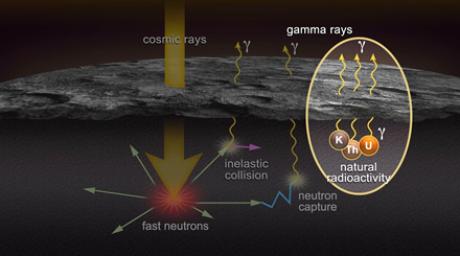
|
Gamma Rays for You and Me
- Click the image above for a larger view
- Full-Res JPEG (440 x 245) (15.9 kB)
- Full-Res TIFF (440 x 245) (324.0 kB)
Caption:
Click here to watch this movie.
This movie is a schematic illustration of the operation of MESSENGER's Gamma-Ray Spectrometer (GRS). Galactic cosmic rays interact with the surface of Mercury to a depth of tens of centimeters, producing high-energy ("fast") neutrons. These neutrons further interact with surface material, resulting in the emission of gamma rays with energies characteristic of the emitting elements and low-energy ("slow") neutrons. Naturally occurring radioactive elements such as potassium (K), thorium (Th), and uranium (U) also emit gamma rays. Detection of the gamma rays and neutrons by GRS allows determination of the chemical composition of the surface.
Date Presented:
September 29, 2011, at a
NASA press briefing
Instrument:
Gamma-Ray Spectrometer (GRS)
Background Info:
The MESSENGER spacecraft is the first ever to orbit the planet Mercury, and the spacecraft's seven scientific instruments and radio science investigation are unraveling the history and evolution of the Solar System's innermost planet. Visit the Why Mercury? section of this website to learn more about the key science questions that the MESSENGER mission is addressing. During the one-year primary mission, MDIS is scheduled to acquire more than 75,000 images in support of MESSENGER's science goals.
These images are from MESSENGER, a NASA Discovery mission to conduct the first orbital study of the innermost planet, Mercury. For information regarding the use of images, see the MESSENGER image use policy .
Cataloging Keywords:
| Name | Value | Additional Values |
|---|---|---|
| Target | Mercury | |
| System | ||
| Target Type | Planet | |
| Mission | MESSENGER | |
| Instrument Host | MESSENGER | |
| Host Type | Orbiter | |
| Instrument | Gamma Ray and Neutron Spectrometer (GRNS) | |
| Detector | ||
| Extra Keywords | Color, Radio | |
| Acquisition Date | ||
| Release Date | 2011-09-30 | |
| Date in Caption | 2011-09-29 | |
| Image Credit | NASA/Johns Hopkins University Applied Physics Laboratory/Carnegie Institution of Washington | |
| Source | photojournal.jpl.nasa.gov/catalog/PIA14854 | |
| Identifier | PIA14854 | |
